Wednesday Feb 18, 2026
Wednesday Feb 18, 2026
Thursday, 30 January 2020 02:05 - - {{hitsCtrl.values.hits}}
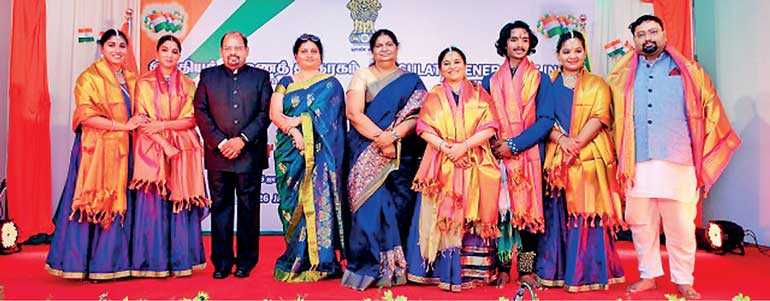
Dance performers with India’s Jaffna Consul S. Balachandran, his wife and Northern Province Governor P.S.M. Charles
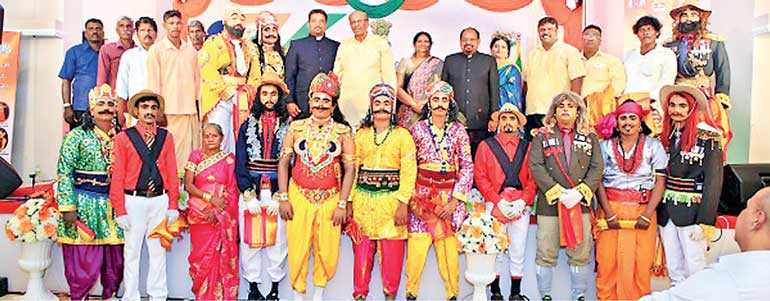
Kattaipomman group with Mayor of Jaffna Emmanuel Arnold and Mavai Senathirajah
India’s Jaffna Consul S. Balachandran
I have just attended a never-to-be-missed function of the 70th anniversary of the Republic Day of India, hosted by the Jaffna Consulate for India at Tilco Hotel on 26 January. It was great!
What a Consul does is normally by the country which he represents as Consul. However, the programs of the Consulate are proposed and driven by the Consul. On that caveat, I say that India’s Consul General, Shri S. Balachandran is owed a big thank you for bringing back haute culture to us in Jaffna.
Being well-read, he saw weaknesses in our language. So, Day in Republic Day became Thinam in Tamil. Likewise, Punn took the place of Iraaham (Raga), etc. The principle is that Sanskrit for Tamil is fine but only if there is no Tamil equivalent. Therefore, he advocates keeping January and not Thai for the first month because the Tamil first of Thai is not the first of January. 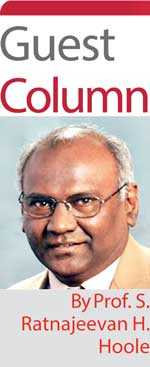
Balachandran, a rare man of books these days, is better read on our history than many university dons. He has been encouraging music and dance programs from India.
Colombo gives us a lot more, but Colombo officials’ aloof distance and denial of war crimes against Balachandran’s personal touch makes us prefer attending India Day to Independence Day where our Government is yet to announce if the National Anthem may be sung in Tamil. We all happily listened to the tune without words.
Banning religion from public spaces
I once had a long discussion with Consul Balachandran that having programs in Hindu temples and of religiously-affiliated music is not being even-handed, especially when Buddhism is thrust down our throats.
He explained his Government’s policy of treating all religions equally – I reminded him of our Government’s policy of multi-religious ceremonies where a Buddhist monk gets pre-eminence with a seat on a chair with a white covering. He takes up most of the time with his sermons, while the Christian, Hindu and Muslim leaders are often unknown to people of their own religions and get barely a fraction of the time.
As if to address this criticism, the four religious leaders were called together by the Consul to light the so-called traditional oil lamp at the same time, and that was all the time allotted to them. It was the closest to banning religion in public space.
Jaffna’s deracination
The barbaric state of our culture is a fact that is difficult to accept in Jaffna. What passes for culture is watching Tamil movies and their songs from Tamil Nadu; as well as building temples (often encroaching on state land) and visiting temples in India.
As the elite left Jaffna and haute culture like dance ceased to be cultivated, dancers were passed out by teachers with shorter training, and accordingly performances saw more the ability to make fixed difficult movements rather than artistically adapting movements to the music.
Music teachers even from the university are reluctant to perform despite being offered the opportunity, says an aficionado, spurning his lucrative offers several times. So we get Indian artistes.
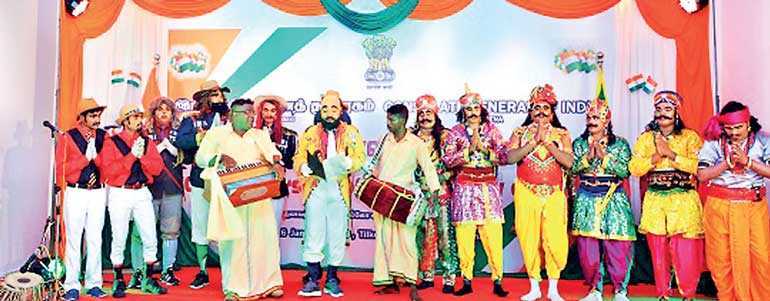
Kattaipomman group
Timeliness too was gone from Jaffna. How important one is, is measured by how a function will be held up till one arrives. So many as if deliberately arrive late. India has changed this. The function started at 10 a.m. sharp.
Adding to our misery, in 2015 we had 148 toddy taverns in Jaffna but today only 122, as those trying to prove our haute culture protest the opening of new taverns. It seems really because of the kind of drinkers we seek. In 2015 we had 39 bars and seven restaurants selling hard liquor. Today it is 48 bars and 28 restaurants, not counting liquor stores like at Food City. The Jaffna District Secretary estimates annual liquor sales in Jaffna to be Rs. 165,300,000.
Jaffna has 63 women using illicit liquor – horrible, but doing well compared to 12,313 men.
The Consul ensured that no liquor was served on the pretext of toasts. It was a day for teetotallers.
India Day 2020
So, the Consul arranged for three items that evening. The first was a veena recital by the Indian artiste Yoga Vandana Jammalamadaka and group. It was good said those better versed than I in music.
However I was more interested in the two persons accompanying her, Prasad on the miruthangam, and Rajasekar who was making funny gestures and faces, keeping our attention.
The second was a Kathak performance by India’s Jayashree Acharya and company. Being Kathak, it was less Sankritised. I was excited by the lone male dancer who reminded me of Chandramuki’s lover in the Rajnikanth movie – betraying in a way the movie culture we thrive in. I do not think it was accidental that his dance partner resembled the beautifully plump Jothika.
On blouses – Resuming battle stations
The dancers’ infectious happy faces kept me happy. The blouses in the armpit area of some dancers turned colour as they sweated, showing they did not exploit the advances through sweat sticks. These dancers had elegant blouses coming well below the waist. They bolstered my argument at home that the sari is a decent dress not requiring, as with the way my mother stitched her blouse and wore it on top of a petticoat, any exposure of the waistline. An aunt in London wore in place of her blouse a t-shirt.
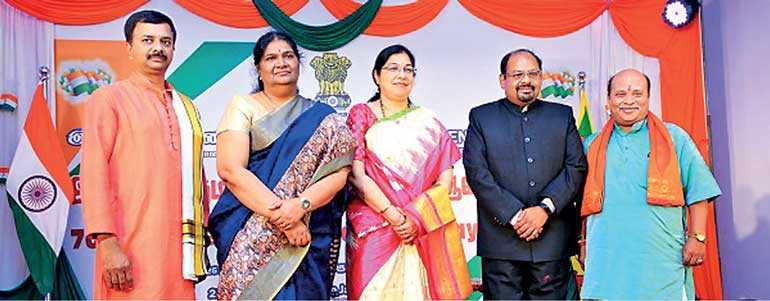
Northern Province Governor P.S.M. Charles with the musicians and India’s Jaffna Consul S. Balachandran
Culturally I sensed when I lived in the West that Europeans saw exposing the waistline as nudity while being comfortable with a low neckline. With four women at home, I had given up my female sartorial battles against low cut and short blouses. The dancers proved my point, being so elegant without being vulgar. Perhaps I should resume my domestic hostilities again.
Non-traditional but authentic Jaffna
The third event was the grand finale. It was an utterly Jaffna thing. There is, unknown to most of us, a Paasaiyur St. Anthony’s Cultural Group. Among its repertoire is the Veerapaandiya Kattaipomman Koothu, meaning a street dance that usually does not have the orthodoxy of religion.
It is no wonder that Koothus, usually performed in their own caste – or geographically – segregated fora by the performers, are buried in obscurity unless brought forth by outsiders – in this case by the Consul and in the case of another prominent Koothu, Ravanesan, by Prof. Maunaguru from the Eastern Province that does not count for anything in Jaffna.
Ravanesan was brought out when Sinhalese got involved in helping Maunaguru stage it at the Lionel Wendt and then Rupavahini. Veerapaandiya Kattaipomman had to receive the Government’s Kalaabooshanam award for us (at least me) to hear about it.
Kattaipomman (played by Jules Collins) was not particularly short (Kattai) but he looked much like Sivaji Ganeshan who portrayed Kattaipomman in the famous movie on which many of my vintage grew up. The clothes were well- and authentically tailored (although I would have preferred a “red coat” for the British). There were swords, epaulets and military medals for the British officials.
The beautiful clothing design was by Mary Cecilia Collins who felt too shy to go up and receive her award for couture. She sent an elderly somebody of hers to receive the award. Later, with her permission, I took her photo for this article.
Mayor Emmanuel Arnold
The Koothu was particularly significant for its Karaiyoor fisher caste players. Equally significant was the ending theme song ‘Mariyaalukku Subamanagalam,’ perhaps the first time to be so mainstreamed.
The Mayor of Jaffna Emmanuel Arnold from the same community made a request to the Consul who encouraged the Koothu.
Ironically Mayor Arnold, when he came forward to contest for a seat in the Jaffna Municipality, was opposed by a high federal party official in the audience on grounds of religion and probably caste too. It is significant that those not at the pinnacle of caste support those at the pinnacle but keep down their competition despite being natural allies in their common struggle for equality.
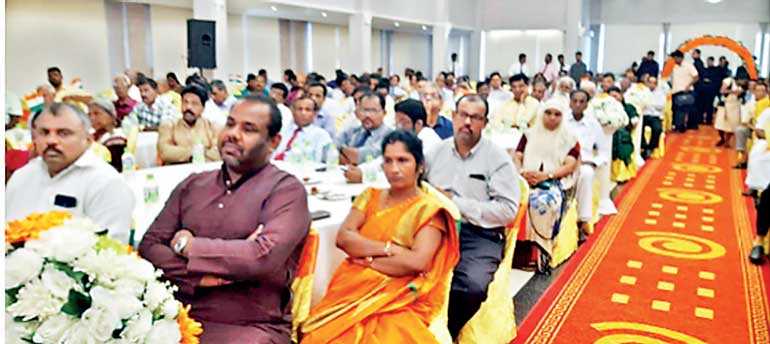
Some politicians not meeting success, their request to boycott elections going unheeded
When Arnold was proposed as Mayor, the objections became more strident, but his party to its credit made him Mayor despite the high level from which the objections came. Today it seems clear that come April and the Parliamentary Elections, Arnold will be a candidate for Parliament, but not the one who objected.
Under an agreement within the TNA, the Federal Party gets only seven of Jaffna’s 10 candidates. Four will go to the current MPs, the remaining three will presumably go to Arnold, a low caste person and a woman. Sumanthiran had proposed to Mavai Senathirajah that all those who would have served two terms, himself included, must make way for new faces. Leaked, this has created a serious spat with E. Saravanapavan who has finished many terms. The careful balancing may be upset.
Sour faces
A group of rejected politicians were present. They have gone out of office, some being defeated at the polls, and all of them having their call to boycott the last Presidential Elections spurned by the people. They watched successful politicians like Arnold and Senathirajah being honoured as protocol demanded, being seated with the Chief Guest P.S.M. Charles and being asked to honour the artistes by inviting them to cover them with a gold shawl. In being asked to honour the artistes, they too were honoured.
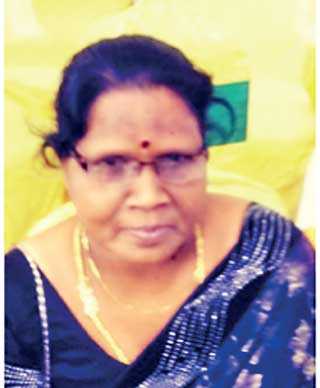 |
|
Mary Cecilia Collins
|
Perhaps it was too much for the rejects and they went away early with dour faces without waiting for the grand meal that was already dished out in buffet trays. To me it was significant that one of the rejected burnt my effigy at the Jaffna University gates when I was successfully elected to the slate of three by the Council and then appointed VC as provided in law until this man moved students against me. In 2005 he led students in stuffing ballot boxes, but the then Elections Department certified the result.
In 2007 when I visited Berlin and stayed with my friend from school to university, Erlumalai Sivakumar, this man threatened Sivakumar for hosting “a traitor”. Those who knew Sivakumar would know that Sivakumar would not let such a threat pass without repercussions.
What will happen this year with this ballot stuffer in Jaffna in the undemocratic company he keeps? If the matter repeats, I pray that the Election Commission will be braver than the Elections Department was.
A female Tamil Governor
The Chief Guest was our new Governor P.S.M. Charles, our first woman and second Tamil. The previous, Dr. Suren Raghaven, a Tamil, left under a cloud after trying to make a person who had been suspended for fraud his Secretary despite the records and was exposed by reporter N. Lohathayalan.
The new President’s office, just ready to reappoint Raghaven, called for the documents cited by Lohathayalan and decided not to take the risk. My experience is that Government officials will ignore the worst corruption they know to exist so long as it is not in writing.
A sign of the times is that Raghaven and the Police Chief, when summoned by the Human Rights Commission to answer my charge of violating my rights in forcibly ordering the removal of Afghan refugees from my home, simply did not turn up. It was contempt from those supposed to uphold the law.
Charles has to be better. She came for the function with two of her daughters, adding a nice touch to the evening. She is well-known for her bravery in resisting political orders to waive duty when she was Customs Chief, and being inflexible when the Government in 2012 tried to alter Vavuniya’s demography.
These are difficult times for Tamils. But the consular function eases our fears for the future.